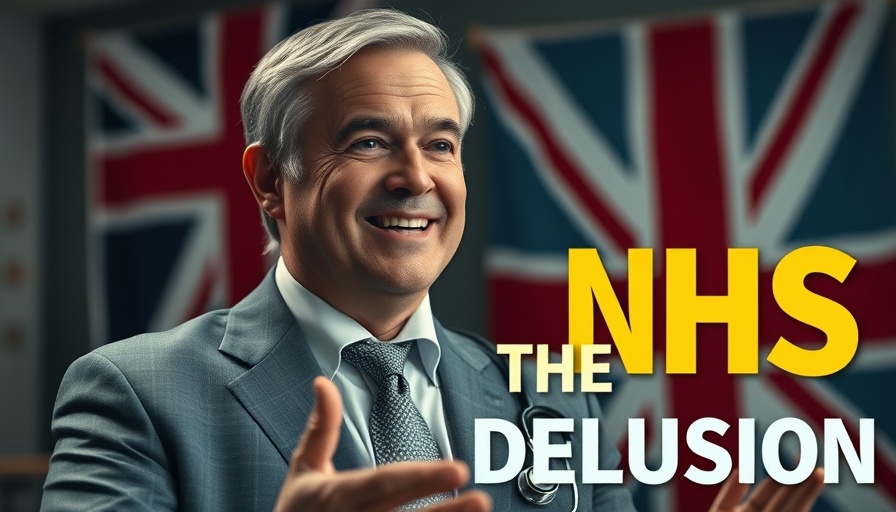
Understanding the Crisis: Is the NHS Truly 'the Envy of the World'?
The metaphorical pedestal upon which the National Health Service (NHS) stands is built on decades of admiration and reverence, often described as 'the envy of the world.' However, Dr. Michael Christopher’s recent appearance on British Thought Leaders challenges this narrative, arguing that such views may stem more from emotional attachment than actual performance. The increasing misalignment of healthcare demand and supply in the UK raises urgent questions: Is the NHS truly serving the public effectively, or is it merely enduring?
In 'The NHS Is Not the Envy of the World, It Needs Reform,' Dr. Michael Christopher sheds light on pressing issues plaguing the NHS, prompting a deeper analysis of our healthcare system.
The Reality of NHS Strain: Capacity Issues at the Core
Within the healthcare community, the crisis attributed to the NHS is not merely a sensational headline; it reflects systemic inefficiencies that hinder patient care. Dr. Christopher asserts that the rampant demand for services is consistently outpacing what the NHS can supply. With scarce capacity to absorb fluctuating patient needs, even minor disruptions—be they strikes or seasonal illnesses—can plunge the system into chaos.
This malady of overextension, exacerbated by COVID-19, presents a distressing future where the service risks becoming primarily a support system for the elderly and those on welfare. If not reformed, it seems destined to struggle, with younger generations possibly turning their backs on it as they seek quicker, more reliable alternatives.
Redundancy and Regulation: Learning from Global Models
As Dr. Christopher notes, one significant difference between the NHS and more efficient systems abroad—like those in Australia or Germany—lies in their redundancy protocols. These healthcare models can adapt more flexibly to emergencies and have built-in safety nets that the NHS lacks. In stark contrast, the NHS's capacity lingers at crisis level without adequate respite, leading to overwhelmed healthcare providers and long patient wait times.
Furthermore, the politicization of the NHS emerges as a recurrent theme in Dr. Christopher's analysis. The convergence of political agendas with healthcare policies complicates any meaningful change, as all parties cling to similar narratives instead of exploring innovative solutions.
Misconceptions and Cultural Worship of the NHS
The reverence with which people regard the NHS is strong, but there's an ongoing debate about its efficacy. Dr. Christopher suggests that this 'worship' has stifled constructive criticism and debate. He points out that the narrative of the NHS being 'the best' has overshadowed discussions about necessary improvements. Other nations also demonstrate effective health systems, yet these alternatives are often dismissed as political threats rather than potential models for reform.
The emotional component of the NHS narrative further complicates public discourse. Politicians frequently refer to the NHS as a sacred institution that must be defended and supported, which makes it difficult to discuss reform-oriented changes without appearing disloyal or unpatriotic.
Is Reform Possible? What Needs to Change
If the NHS is to evolve into a system that meets the demands of contemporary society, it requires strategic and systemic reforms. Drawing from international examples, there are several avenues for legislative and operational improvement:
- Introduce Competition: Competition can foster efficiency and drive innovation. By allowing healthcare providers to operate in tandem with the NHS, services could improve and waiting times could decrease.
- Redefine Funding Models: Revising how the NHS is funded could enable it to operate more like healthcare systems in other developed countries, where government oversight is maintained without stifling private innovation.
- Focus on Preventative Care: By prioritizing health education and prevention, the NHS could relieve pressure on urgent care services and improve overall public health.
While Dr. Christopher acknowledges the complexities surrounding these proposals, he underscores the need for bold action. Such reforms should be informed by sound public discourse rather than driven solely by political expediency.
Could the Next Generation Lead the Charge for Change?
With the younger population increasingly disenchanted with the NHS, they represent a pivotal opportunity for change. By advocating for a healthcare system that aligns with their needs—streamlined, effective, and readily accessible—they could become the catalysts who drive the movement towards reform.
The message is clear: for the NHS to remain relevant and functional for future generations, it must evolve from its current form. The preservation of healthcare that is free at the point of delivery need not equate to preserving the current structure. There is ample room for improvement.
 Add Row
Add Row  Add
Add 










Write A Comment